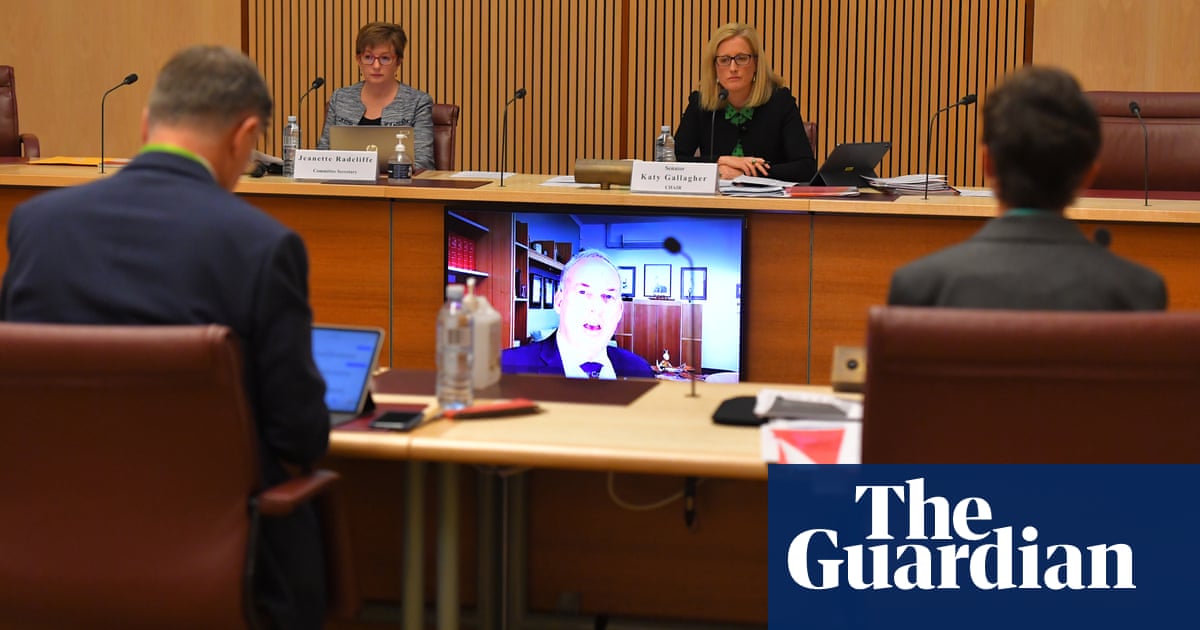
Scott Morrison has declared he still has confidence in his aged care minister after Richard Colbeck came under pressure at a Senate inquiry and was unable to recall how many people had died in aged care during the pandemic.
Colbeck apologised on Friday for the times when the Morrison government “didn’t get everything right” in dealing with aged care outbreaks – but insisted it had been prepared for what it sincerely believed to be the worst-case scenarios.
The minister’s performance – described by the opposition as “embarrassing” – overshadowed the government’s announcement of an extra $171m in federal funding for the aged care response.
When the minister was unable to say how many people had died in aged care settings, federal health department officials answered instead, noting 258 care recipients had passed away in Victoria, including 254 who were residential care recipients and four who were home care recipients. The current number of active cases in Victorian aged care settings is 1,811. Nationally, 292 people with Covid-19 have died in aged care during the pandemic.
Speaking after a national cabinet meeting on Friday, Morrison said he had confidence in Colbeck’s performance as a minister but said he was “sure the minister regrets not being able to bring those figures immediately to mind”.
The prime minister said it was “a very demanding environment in which to be working”. Morrison said the extra $171m in federal funding would bring its contribution during the pandemic above $1bn.
The funding includes $81m to provide additional “surge” workforce and increased training for aged care workers, along with $12.5m to support residents and their families with grief and trauma support services.
The federal Aged Care Quality and Safety Commission will receive $9m to step up its checks on how facilities are preparing for and responding to Covid-19 outbreaks.
At Friday’s national cabinet meeting, state and territory leaders backed a plan to set up emergency response operations centres for aged care if community transmission became a concern.
The centres would be similar to the joint federal-state aged care coordination centre set up in Victoria last month – but Morrison said there was no need to establish one outside that state at this stage.
The acting chief medical officer, Prof Paul Kelly, said federal, state and territory governments would also “redouble our efforts to make sure that the sector is absolutely prepared” for outbreaks.
To that end, a panel of Australia’s chief medical and health officers will launch a “time-limited” aged care advisory group “bringing together a broad range of critical expertise about the aged care sector, infection control and emergency preparedness”, according to a federal government statement.
Earlier, Colbeck said the situation in Victoria remained “extremely fragile” and he angrily hit back at “offensive” claims the federal government had effectively been “absent” during the crisis.
Returning to the Senate’s Covid-19 committee for the first time since a royal commission heard evidence the federal government had not properly planned for aged care outbreaks, Colbeck apologised for the times when “we haven’t got it right”.
Colbeck accepted that the federal government was the principal funder and regulator of age care in Australia – but insisted that “in combination with the states it is everybody’s responsibility to prevent the spread of the virus”.
The loss of life had been “an absolute tragedy”, he said. When pressed on whether the system he was in charge of had failed to respond properly, he said the system had been “under extreme stress”.
“In some circumstances … we haven’t got it right. We apologise for that,” Colbeck said.
But he held to the government’s line that it was impossible to avoid outbreaks in aged care facilities when there was community transmission of Covid-19, and he maintained that it was “a combined federal government-state government responsibility for public health”.
Colbeck pushed back strongly when the Labor chair, Katy Gallagher, asked about the devastating scenes playing out in Victoria and why the federal government was “absent”.
The minister said he found that assertion offensive. “The government wasn’t absent. The government has been there every single step of the way providing every single resource it could muster in the interests of these people,” he said.
“We are all mortified by the circumstances that we have found in those facilities in Victoria,” he said.
Colbeck said the situation in Victoria had stretched the resources of the entire health sector, with close to 2,000 residential aged care workers furloughed because of being either Covid-19 positive or close contacts.
The minister was challenged over the accuracy of a press release he issued on 12 April that assured people that the government had “plans in place for worst-case scenarios where an outbreak in aged care facilities mean local staff are unable to continue to provide care due to an infection in the service”.
Colbeck said on Friday he stood by that statement, but said the government had not expected workforce issues to extend beyond care staff, which is what eventuated at St Basil’s in Victoria.
“We did not anticipate that the entire management structure and the office structure, cleaning, catering staff would all be regarded as close contacts as part of an outbreak.”
He confirmed he had received a report in April on the outbreak at Dorothy Henderson Lodge in Sydney, which noted that almost all care staff had been furloughed.
Kelly, the acting chief medical officer, was asked on Friday whether the total and sudden withdrawal of an aged care workforce was really unforeseeable.
“I think that’s getting into pedantics of words at the moment, but certainly it was unprecedented,” Kelly told reporters. “Could we have foreseen that? That’s a matter of debate.”
Labor’s spokesperson for ageing and seniors, Julie Collins, told reporters Morrison and Colbeck’s performance was “not good enough” and families deserved to hear an unreserved apology.
“Nothing for those families who have lost loved ones is ever going to bring back their loved person because of the months that were wasted by the government when he didn’t do enough.”
The Guardian





